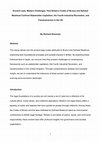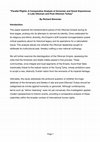Drafts by Richard Simonian

Ancient Laws, Modern Challenges/ How Britain’s Codes of Brutus and Dyfnwal Moelmud Confront Stakeholder Capitalism, The Fourth Industrial Revolution, and Transhumanism in the UK , 2025
This essay undertakes a comprehensive examination of Britain’s ancient legal heritage, focusing o... more This essay undertakes a comprehensive examination of Britain’s ancient legal heritage, focusing on the Codes of Brutus and Dyfnwal Moelmud, and explores their enduring relevance in addressing modern challenges. Although centuries have elapsed since these statutes were conceived, their foundational principles—justice, equity, communal welfare, and adaptability—continue to resonate in an era dominated by stakeholder capitalism, the Fourth Industrial Revolution, and the emerging discourse on transhumanism. By tracing the historical context of these ancient codes, the essay illustrates how they structured early British society, emphasizing collective responsibility and proportionate justice as key pillars of governance.
In turn, this discussion illuminates how stakeholder capitalism might benefit from these time-honoured notions of moral accountability and social equity—values that can temper contemporary market pressures. Likewise, the Fourth Industrial Revolution, with its rapid technological innovations, can draw upon the ancient emphasis on ethical oversight and communal engagement to ensure that progress does not undermine fundamental human rights. Moreover, the essay delves into the ethical boundaries of transhumanism, revealing how historical concerns regarding the natural order, moral limits, and social cohesion offer a critical lens through which to view human enhancement technologies.
By comparing these traditional legal frameworks with the demands and dilemmas of modern life, the essay posits that integrating ancient wisdom into contemporary policy could yield a more balanced and equitable societal model. Ultimately, the study calls for a renewed appreciation of Britain’s legal origins, suggesting that these ancestral insights may guide us toward just, inclusive, and adaptable solutions for the complex challenges of the twenty-first century.
The way we honour and lay to rest our loved ones is a deeply personal and culturally significant ... more The way we honour and lay to rest our loved ones is a deeply personal and culturally significant practice. In the United Kingdom, burial customs have evolved over millennia, reflecting changes in religious beliefs, societal structures, and legal frameworks. From ancient pagan rituals to modern-day cemetery burials, the methods and locations chosen for interment have varied widely. Recently, there has been a resurgence of interest in private land burials, including in one's own garden. This practice, while offering a personalised and intimate farewell, raises important legal and practical considerations.

This essay explores the transformative period of the Ottoman Empire's decline and the emergence o... more This essay explores the transformative period of the Ottoman Empire's decline and the emergence of modern Turkey, examining the profound impacts on ethnic minorities, particularly Armenians and Greeks. It addresses three pivotal questions: Did the Ottoman Empire intentionally attempt to erase its ethnically diverse identity? What role did the Greek and Armenian communities play in the disintegration of the Empire? And, were the tragic fates of these communities during and after the Empire's collapse cases of genocide? Through a detailed historical analysis, the paper affirms that the Empire sought to homogenize its identity by marginalizing and erasing minority cultures. It also suggests that while the minorities did influence the Empire's trajectory, the lack of democratic reforms akin to those in contemporary Western societies contributed significantly to the Empire's downfall. Furthermore, the treatment of these minorities meets the modern criteria for genocide, highlighting a need for stronger legal and social frameworks to prevent such atrocities in the future. This study draws on a range of historical accounts and scholarly interpretations, arguing that the legacies of these events continue to necessitate vigilance and proactive governance in today's global context.

The Salem Witch Trials of 1692, 2015
The Salem Witch Trials, an infamous episode in early American history, continue to captivate the ... more The Salem Witch Trials, an infamous episode in early American history, continue to captivate the imagination and spark intrigue in the minds of scholars and the public alike. Unfolding in 1692 in the quaint village of Salem, Massachusetts, this haunting tale of mass paranoia and superstition shook the foundations of a once-unified community, tearing neighbour from neighbour, friend from friend, and family from family.
The seeds of the Salem Witch Trials were sown in a society rife with religious fervour, where spiritual leaders held both political and moral authority. Accusations of witchcraft, deemed a crime against the church and state, carried the penalty of death, creating an atmosphere of terror and suspicion that permeated every aspect of daily life.
From the vantage point of history, the trials' tragic absurdity becomes evident. Innocent lives were extinguished based on spectral evidence and the ravings of afflicted children, caught in a web of deception spun by fear and vindictiveness. Women bore the brunt of the hysteria, with over 90% of those accused being female, victimised by deeply ingrained patriarchal beliefs and societal expectations.
As the trials unfolded, innocence mattered little. The accused faced a grim choice - confess and suffer forfeiture of property or maintain their innocence and endure the harrowing torment of incarceration. Giles Corey's defiant silence, his body pressed under the weight of stones in a cruel bid to protect his estate, became a haunting symbol of resistance against an oppressive judicial system.
The Salem Witch Trials came to a tumultuous end with the intervention of Governor Phip's compassionate hand, sparing countless lives. Yet, the echoes of this dark chapter persist, serving as a chilling reminder of how collective hysteria, injustice, and the abuse of power can lead to the darkest depths of human behaviour.
In this haunting exploration of the Salem Witch Trials, we delve into the complexities of human nature, the vulnerability of the human psyche, and the dangers of unchecked fanaticism. Through rigorous examination and empathy, we seek to understand this tragic chapter in our past, ensuring that the lessons it imparts resonate for generations to come.
Papers by Richard Simonian
In the tumultuous backdrop of the English Revolution spanning from 1640 to 1660, Gerrard Winstanl... more In the tumultuous backdrop of the English Revolution spanning from 1640 to 1660, Gerrard Winstanley emerges as a captivating figure-a radical leader at the helm of the Digger movement.











Uploads
Drafts by Richard Simonian
In turn, this discussion illuminates how stakeholder capitalism might benefit from these time-honoured notions of moral accountability and social equity—values that can temper contemporary market pressures. Likewise, the Fourth Industrial Revolution, with its rapid technological innovations, can draw upon the ancient emphasis on ethical oversight and communal engagement to ensure that progress does not undermine fundamental human rights. Moreover, the essay delves into the ethical boundaries of transhumanism, revealing how historical concerns regarding the natural order, moral limits, and social cohesion offer a critical lens through which to view human enhancement technologies.
By comparing these traditional legal frameworks with the demands and dilemmas of modern life, the essay posits that integrating ancient wisdom into contemporary policy could yield a more balanced and equitable societal model. Ultimately, the study calls for a renewed appreciation of Britain’s legal origins, suggesting that these ancestral insights may guide us toward just, inclusive, and adaptable solutions for the complex challenges of the twenty-first century.
The seeds of the Salem Witch Trials were sown in a society rife with religious fervour, where spiritual leaders held both political and moral authority. Accusations of witchcraft, deemed a crime against the church and state, carried the penalty of death, creating an atmosphere of terror and suspicion that permeated every aspect of daily life.
From the vantage point of history, the trials' tragic absurdity becomes evident. Innocent lives were extinguished based on spectral evidence and the ravings of afflicted children, caught in a web of deception spun by fear and vindictiveness. Women bore the brunt of the hysteria, with over 90% of those accused being female, victimised by deeply ingrained patriarchal beliefs and societal expectations.
As the trials unfolded, innocence mattered little. The accused faced a grim choice - confess and suffer forfeiture of property or maintain their innocence and endure the harrowing torment of incarceration. Giles Corey's defiant silence, his body pressed under the weight of stones in a cruel bid to protect his estate, became a haunting symbol of resistance against an oppressive judicial system.
The Salem Witch Trials came to a tumultuous end with the intervention of Governor Phip's compassionate hand, sparing countless lives. Yet, the echoes of this dark chapter persist, serving as a chilling reminder of how collective hysteria, injustice, and the abuse of power can lead to the darkest depths of human behaviour.
In this haunting exploration of the Salem Witch Trials, we delve into the complexities of human nature, the vulnerability of the human psyche, and the dangers of unchecked fanaticism. Through rigorous examination and empathy, we seek to understand this tragic chapter in our past, ensuring that the lessons it imparts resonate for generations to come.
Papers by Richard Simonian
In turn, this discussion illuminates how stakeholder capitalism might benefit from these time-honoured notions of moral accountability and social equity—values that can temper contemporary market pressures. Likewise, the Fourth Industrial Revolution, with its rapid technological innovations, can draw upon the ancient emphasis on ethical oversight and communal engagement to ensure that progress does not undermine fundamental human rights. Moreover, the essay delves into the ethical boundaries of transhumanism, revealing how historical concerns regarding the natural order, moral limits, and social cohesion offer a critical lens through which to view human enhancement technologies.
By comparing these traditional legal frameworks with the demands and dilemmas of modern life, the essay posits that integrating ancient wisdom into contemporary policy could yield a more balanced and equitable societal model. Ultimately, the study calls for a renewed appreciation of Britain’s legal origins, suggesting that these ancestral insights may guide us toward just, inclusive, and adaptable solutions for the complex challenges of the twenty-first century.
The seeds of the Salem Witch Trials were sown in a society rife with religious fervour, where spiritual leaders held both political and moral authority. Accusations of witchcraft, deemed a crime against the church and state, carried the penalty of death, creating an atmosphere of terror and suspicion that permeated every aspect of daily life.
From the vantage point of history, the trials' tragic absurdity becomes evident. Innocent lives were extinguished based on spectral evidence and the ravings of afflicted children, caught in a web of deception spun by fear and vindictiveness. Women bore the brunt of the hysteria, with over 90% of those accused being female, victimised by deeply ingrained patriarchal beliefs and societal expectations.
As the trials unfolded, innocence mattered little. The accused faced a grim choice - confess and suffer forfeiture of property or maintain their innocence and endure the harrowing torment of incarceration. Giles Corey's defiant silence, his body pressed under the weight of stones in a cruel bid to protect his estate, became a haunting symbol of resistance against an oppressive judicial system.
The Salem Witch Trials came to a tumultuous end with the intervention of Governor Phip's compassionate hand, sparing countless lives. Yet, the echoes of this dark chapter persist, serving as a chilling reminder of how collective hysteria, injustice, and the abuse of power can lead to the darkest depths of human behaviour.
In this haunting exploration of the Salem Witch Trials, we delve into the complexities of human nature, the vulnerability of the human psyche, and the dangers of unchecked fanaticism. Through rigorous examination and empathy, we seek to understand this tragic chapter in our past, ensuring that the lessons it imparts resonate for generations to come.